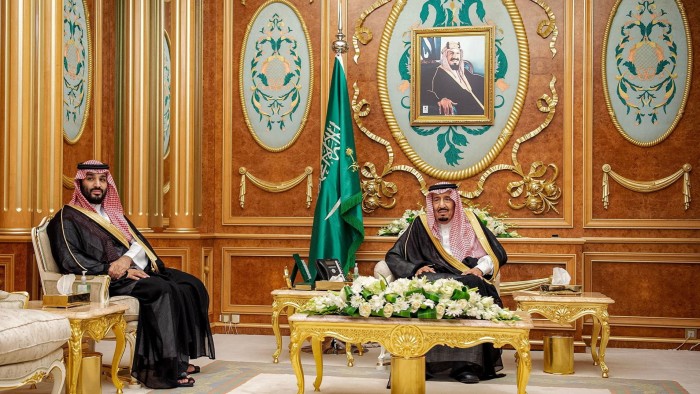Physical Address
304 North Cardinal St.
Dorchester Center, MA 02124
Physical Address
304 North Cardinal St.
Dorchester Center, MA 02124

Arab monarchies are seeking to stay close to their regional rival Tehran as they frantically try to avoid being engulfed in the war on the other side of the Gulf and to head off potential Iranian missile attacks.
As Donald Trump considers US strikes on Iran, leaders of Arab states have spoken regularly to their counterparts in the Iranian capital.
They fear US involvement would put Gulf states that host American bases in the line of fire, and could even strangle their oil and gas exports if Iran retaliated by closing the Strait of Hormuz.
Since Israel launched its offensive last week, the rulers of Saudi Arabia and the United Arab Emirates — the region’s biggest economies — have spoken with Iranian President Masoud Pezeshkian to express solidarity, and repeatedly condemned Israel’s attacks.
Qatar’s Emir spoke with Pezeshkian and received a letter from him; the Sultan of Oman had a call with the Iranian president, while foreign ministers from Saudi Arabia, the UAE, Qatar, and Kuwait have all spoken with Iran’s foreign minister Abbas Araghchi.
For Washington’s allies that host American bases, US military intervention would be the “worst-case scenario come true”, said Bader Al-Saif, assistant professor at Kuwait University.
The US’s Gulf allies were “bound to be guilty by association if America takes on Iran”, said Abdulkhaleq Abdulla, Dubai-based senior fellow at the Harvard Kennedy School.
The Gulf states are leading efforts to broker talks. An Arab diplomat said Qatar and Oman had conveyed a message from Tehran to Washington — that it is willing to talk if Israel’s attacks stop.
Gulf states have also called for talks and a ceasefire, and a return to US-Iran negotiations over Tehran’s nuclear programme.
Qatar and Oman are considered the Gulf states with the closest ties to Iran, but the Gulf’s powerhouses — the UAE and Saudi — have a fraught relationship with Tehran. They have long criticised the Islamic republic as a destabilising force and initially backed Trump’s so-called “maximum pressure” sanctions campaign.

Gulf rulers have strong relations with Trump, and his visit to the region last month was considered a success. The US president drew applause in Riyadh when he chastised past US “nation-builders” and “neocons” for their failed Middle East interventions.
Soon after Israel’s initial attack, Trump spoke with the Emir of Qatar, which hosts the region’s largest US military base, and Saudi Arabia’s day-to-day ruler Crown Prince Mohammed bin Salman.
But the region’s monarchs fret about the US leader’s unpredictability, and are concerned that the US would not be fully committed to their protection should they be dragged into war. Since Hamas’ October 7 attack in 2023the Gulf states have told the US not to use their bases to hit Iran for fear of retaliation.
An Arab diplomat said Iran was unlikely to attack Gulf states unless they or the US became involved in the war.
While major cities such as Dubai and Riyadh have felt little impact so far from the latest conflict, the region is tense; Kuwaitis have watched missiles streak overhead and Bahrain tested its emergency sirens on Tuesday.
Some observers do not believe Iran would risk further isolation and retaliation by inflicting pain on Gulf states. Tehran’s military has also been badly weakened by Israel’s attacks.
But Gulf states still fear that US military action would aggravate an already inflamed region and put their détente with Iran at risk.
If the US strikes Iran“we have no choice but to retaliate wherever we find the targets necessary to be acted upon,” Iran’s deputy foreign minister Majid Takht-Ravanchi told CNN on Tuesday.
Much closer to Iran than Israel, the Gulf can be hit by shorter-range Iranian missiles, with far less time to react.
Saudi and Emirati troops fought against Iran-allied Houthi rebels in Yemenand Houthis fired missiles and drones in Saudi Arabia until a 2022 truce.
In 2019, Iran was blamed for a missile and drone attack on the heart of Saudi Arabia’s oil infrastructure that temporarily knocked out half its crude output. The assault was viewed as a response to Trump’s “maximum pressure” campaign against the Islamic republic, and Gulf leaders were frustrated by what they saw as a weak US response.

Sensing that the US’s commitment to its defence was shaky, the Gulf moved to defuse regional tensions.
The autocratic states were still quietly pleased to see Iranian-backed militant groups, including Hizbollah in Lebanon, degraded by Israel over the past year. Don Bacon, a Republican Congressman visiting the region, said he was told “universally” by Arab leaders that “Iran, a nuclear-armed Iran, is an existential threat”.
But while Gulf countries had been warming up to Israel — with the United Arab Emirates and Bahrain both signing normalisation agreements with the Jewish state in 2020 — they view an unchecked Israel as deeply destabilising. They have been highly critical of Israel’s conduct of its 20-month war against Hamas in Gaza, and its strikes in Syria as a new government seeks to stabilise the country.
While the absolute monarchies may be wary of a nuclear-armed Iran, that is “not at the expense of an Israeli hegemon that upsets the balance of power,” said Saif.
The Gulf sees Israel and Iran as two sources of instability, said Abdulla: “One is about to be eliminated, but the other is feeling emboldened . . . an imperial Israel, is it good for the region? I don’t think so.”